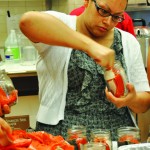Article and photos by Brandi N. Montreuil

Millions of canners around the world can food items such as fish, fruit, vegetables, jams, and jellies as a way to preserve fresh ingredients for a shelf life up to one year. The list of benefits to canning is large and includes knowing where your food comes from, and the ability to incorporate healthy foods into meals at any time, while also knowing that fresh foods will be available to you throughout the year.
While canning has gone through many stages of evolution since its introduction to the masses in the late 1700s, it continues to offer the main benefit of fresh foods at low cost.
In collaboration with the Karen I. Fryberg Health Clinic’s Diabetes Program and Restoring Program, a series of Food Preservation classes are being held at the Hibulb Cultural Center for community members interested in learning how native foods can be preserved and incorporated into a modern diet.
With donated king and sockeye salmon by the Tulalip Tribes Forestry Department, on July 19th Food Preservation students were able to have a hands-on lesson in pressurized salmon canning with instructor Suzy Hymus.
“This is an opportunity for our people to choose what to eat. We have always had ways to preserve our foods for what we needed, but since we have been put onto reservations, our diets have been forced to change. This will help us to take responsibility of our own foods,” explained the Hibulb Cultural Center Rediscovery Coordinator, Inez Bill.
In addition to canning, health clinic staff were on site to offer A1C testing to participants. The A1C is a common blood test used to diagnose type 1 and type 2 diabetes, with results reflecting an average blood sugar level for up to three months. The test will measure the percentage of hemoglobin, a protein in red blood cells that carry oxygen, coated with sugar. If your A1C test shows a high level you can be at risk of diabetes.
“I think it is wonderful we have this collaboration of resources and preserving the food. It is a great opportunity, and by this we are also preserving culture,” remarked Bryan Cooper, Karen I. Fryberg Health Clinic Nurse Practitioner.
“I have been canning fish for years, I even taught my husband to can. But it has been years since I’ve done it. So this class is a refresher course for me. They have all these new tools for canning. I am excited, this is my motivation to teach my kids,” said tribal member, Valerie Matta.
Instructor Suzy Hymus introduced students to the pressurized canning pots used to seal glass jars from bacteria and contamination. Jars filled with pre-measured and sliced salmon are cooked during the pressurization stage, which takes roughly one hundred minutes at 240 degrees Fahrenheit.
For sustained nutritional value, bones are not removed during the cutting stage. Suzy also advises when canning salmon only add two or three inches of water to each jar.
“When we use pressurized canning, we use it for meat and low acid fruits. To pressure can you don’t actually add anything, but people do add sugar if they have smoked salmon, or they add garlic cloves to the jars,” explained Suzy.
Suzy also explained that using a thin layer of paraffin wax to seal canned jams is no guarantee that jars are sealed completely, allowing mold and bacteria to fester under the layer of wax, and advises against using it.
Once salmon has been properly pressurized it can be stored for one year before it is no longer edible, and since the salmon is cooked during the pressurizing, it is available for consumption during the length of its shelf life.
“By preserving the food, we are able to harvest at the peak of the season through various methods. Our goal in this program is to have these methods available for our people to experience and learn so they can apply these simple techniques for their families. These methods are often less expensive and healthier than processed or store purchased foods,” said health clinic staff member, Roni Leahy.
For more information on the Food Preservation Classes please, contact Roni Leahy at 360-716-5642.